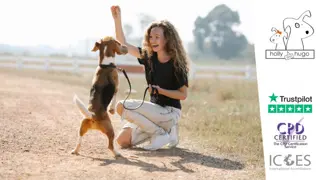
Animal Training and Pet Sitting
CPD Certified | International Accreditation with ICOES | Multiple Certification Options | Detailed Training
Holly and Hugo
Summary
- Proof of Completion - Free
- Certificate of Achievement - £18.99
- ICOES Digital Certificate - £23.99
- ICOES Certificate - Hard Copy - £29.99
- Continuing Professional Development (CPD) - £39.99
- Exam(s) / assessment(s) is included in price
Add to basket or enquire
Overview
This course takes you through all the skills and knowledge you need to be able to step into pet owners’ shoes in their absence. As well as learning how to care for all kinds of needs in different species of animal and fish, you’ll be educated on things like safety and security, handling a crisis, and when to look for help.
CPD
Course media
Description
Pet sitting and dog walking allow you to get paid to work, play, and take care of animals. Pet owners are prepared to pay top dollar for someone who really loves animals and has been trained to look after them in the way they deserve
This course takes you through all the skills and knowledge you need to be able to step into pet owners’ shoes in their absence. As well as learning how to care for all kinds of needs in different species of animal and fish, you’ll be educated on things like safety and security, handling a crisis, and when to look for help.
Taking care of lovable creatures is not only a fulfilling career, it also gives owners peace of mind. Using the training in this course is bound to get you many recommendations which will help grow your business. Start preparing for your new independent and rewarding career today.
Course Syllabus
Module 1: Training Puppies
- 1.1 Reward based training
- 1.2 Crate training
- 1.3 Basic commands
- 1.4 Basic handling
- 1.5 House training
- 1.6 Socialization
- 1.7 Problem behaviors
- 1.8 Fun and games
Module 2: Training Of Adult Dogs
- 2.1 Reappraise basic training
- 2.2 Reward based training
- 2.3 Recognizing bad habits
- 2.4 Consistent Commands
- 2.5 Anti-social problem
- 2.6 Confidence building
- 2.7 Teaching an old dog, new tricks
Module 3: Cat Training
- 3.1 Clicker training
- 3.2 Litter box training
- 3.3 Scratching or clawing
- 3.4 Jumping on furniture
- 3.5 Socialization
Module 4: Bird Training
- 4.1 Clicker training
- 4.2 Speaking
- 4.3 Socialization
- 4.4 Handling
Module 5: Fundamentals Of Dog Walking And Pet Sitting
- 5.1 Keeping you and all pets safe
- 5.2 How to handle an attacking dog
- 5.3 When you'll need to involve a vet
- 5.4 Entering and leaving pets’ homes securely
- 5.5 What you're responsible for
Module 6: Out And About – professional Dog Walking
- 6.1 Be prepared - what to be on the lookout for
- 6.2 Reading dogs’ body language
- 6.3 Understanding aggression
- 6.4 The dynamics of dog fights and how to avoid/intervene
- 6.5 Complying with the law
Module 7: Disease, Health And Hygiene
- 7.1 How to keep pets’ bedding and general environment clean and hygienic
- 7.2 Control of disease and infection
- 7.3 Keeping yourself safe from infection
- 7.4 Zoonosis
- 7.5 How to administer medication safely
Module 8: Being Professional With Clients
- 8.1 Getting off to a good start
- 8.2 The information you need to ask
- 8.3 Microchipping and other forms of ID
- 8.4 Arranging entry/security details
- 8.5 What clients are likely to ask
- 8.6 Outlining your business T&Cs
- 8.7 Agreeing costs
Module 9: Handling And Getting Around With Your Pets
- 9.1 Usual handling equipment and restraints you'll need
- 9.2 Approaching a nervous animal
- 9.3 Predicting unpredictable behavior
- 9.4 How to handle cats and dogs correctly
- 9.5 How to handle exotic pets correctly
- 9.6 How to transport pets safely
Module 10: Specific Information On Dogs And Cats
- 10.1 Correct levels of exercise
- 10.2 Necessary nutrition
- 10.3 Understanding behavior and retraining when needed
- 10.4 How elderly pets can change
- 10.5 Physical care and grooming
- 10.6 Need for love and affection
- 10.7 Recognizing signs of common diseases
Module 11: First Aid
- 11.1 On the spot diagnosis
- 11.2 Vomiting and diarrhea
- 11.3 Poisoning
- 11.4 Cuts, grazes, wounds and burns
- 11.5 Breaks and fractures
- 11.6 Shock
- 11.7 CPR
- 11.8 Contents of your first aid kit
Module 12: Specific Information On Rabbits & Guinea Pigs
- 12.1 Different breeds
- 12.2 Common problems and diseases
- 12.3 Providing an adequate living environment
- 12.4 Exercise
- 12.5 Usual care needed
Module 13: Specific Information On Hamsters, Gerbils, Mice & Exotic Rats
- 13.1 Different breeds
- 13.2 Understanding behavior
- 13.3 Common problems and diseases
- 13.4 Providing an adequate living environment
- 13.5 Usual care needed
Module 14: Specific Information On Birds
- 14.1 General tips on caring for birds
- 14.2 Small birds
- 14.3 Larger birds & birds of prey
- 14.4 Poultry
- 14.5 The parrot family
- 14.6 Recognizing common diseases and preventing spread
Module 15: Specific Information On Fish
- 15.1 How to care for fish
- 15.2 Tropical fish
- 15.3 Cold water fish
- 15.4 Marine fish
- 15.5 Recognizing disease and what to do
Module 16: Specific Information On Reptiles
- 16.1 How to care for reptiles
- 16.2 Challenges of keeping reptiles as pets
- 16.3 Looking after turtles, terrapins and tortoises
- 16.4 Snakes & lizards
- 16.5 Recognizing disease and what to do
Module 17: How Pet Sitting Can Get You Up And Running In Business
- 17.1 Setting up
- 17.2 Arranging finance & insurance
- 17.3 Regulations
- 17.4 Being creative with services
- 17.5 Advertising & marketing
Who is this course for?
- All animal lovers looking for a dream job working with pets.
- Pet parents who want to properly care for, understand, and train their animals.
- Pet sitters, dog walkers, and other professionals who want to deliver a better service for their clients.
- Those interested in owning animals, volunteering at animal shelters, or fostering animals.
All courses are accredited by the International Council for Online Educational Standards (ICOES). After passing any exams and completing a course successfully, students can opt to purchase an ICOES certificate from the third-party institution.
Holly and Hugo is also CPD certified, meaning the courses meet or exceed Continuing Professional Development standards and benchmarks.
Requirements
Holly and Hugo courses are designed for anyone with an interest in learning. No formal qualifications are required. Our courses are suitable if you want to learn new skills, start a new career, or if you’re already working in a particular industry and wish to upgrade your talents and enhance your resume.
Career path
- Find a job or voluntary position working with animals.
- Be your own boss and start your career in pet sitting, dog walking, or animal care.
- Existing animal care workers in pursuit of promotion or a raise - certification will prove to employers that you are serious in your wish to land a dream job with animals.
Questions and answers
Currently there are no Q&As for this course. Be the first to ask a question.
Certificates
Proof of Completion
Digital certificate - Included
Certificate of Achievement
Digital certificate - £18.99
ICOES Digital Certificate
Digital certificate - £23.99
ICOES Certificate - Hard Copy
Hard copy certificate - £29.99
Continuing Professional Development (CPD)
Digital certificate - £39.99
Reviews
Currently there are no reviews for this course. Be the first to leave a review.
Legal information
This course is advertised on reed.co.uk by the Course Provider, whose terms and conditions apply. Purchases are made directly from the Course Provider, and as such, content and materials are supplied by the Course Provider directly. Reed is acting as agent and not reseller in relation to this course. Reed's only responsibility is to facilitate your payment for the course. It is your responsibility to review and agree to the Course Provider's terms and conditions and satisfy yourself as to the suitability of the course you intend to purchase. Reed will not have any responsibility for the content of the course and/or associated materials.



